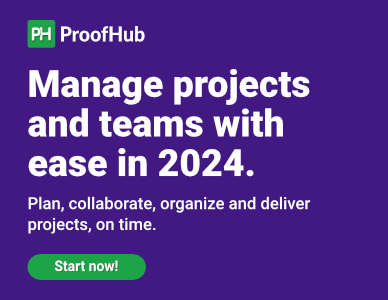Recall all the wisdom you’ve collected on productivity, time management, smart work, etc, and throw it out of the window.
All these ambitious terms have one definite, meaningful replacement – Deep Work.
This Deep Work Guide is for you in case you’re looking to make more life, at the end of your workday.
Obviously, more life will have its own meaning for you. Ranging from a durable sense of happiness, to better professional performance, or simply making more time for what you love.
All of these things are more than achievable, and there’s no wondrous secret technique that you’d need to learn. You just have to do what you’re already doing, just in this new way.
The way is called Deep Work.
Thanks to his Deep Work habits, Adam Grant (inspiration for this piece), became the youngest professor ever at Wharton School (University of Pennsylvania) while completing 60+ research publications, and writing the New York Times bestseller, Give and Take, before he turned 29.
He figured a rather simple yet brilliant formula to be extremely productive. It’s worth mentioning that despite his extreme achievements, he spends less time working than most of his peers.
At this point, one may think that “this is not for me”. Deep Work is for gifted people, with extraordinary abilities, who have conquered their willpower, and untangled life’s mysteries – which is untrue.
Deep Work is for everyone, and without making any more claims, let me show you what it means, and how it is done.
What is deep work?
Deep Work is basically being deeply immersed in the task, free from distractions, in order to achieve optimum productivity and desired value.
It’s like “zoning into” the task with so much focus that not only are you swift but highly engaged. The outcome is increased productivity and improved work quality.
As you’d have figured modern routines don’t allow for Deep Work. People today work with dangling attention spans, sporadically consumed in several screens, unable to give undivided focus to one thing at a time. It’s a life full of mellow regrets, compromised abilities, and a confused state of struggle.
If you’re ready to overcome these, this Deep Work guide offers a pathway.
Deep Work principles were laid down by Cal Newport, who in his book, Deep Work: Rules for Focused Success in a Distracted World explains how it holds the potential to turn lives around.
The idea is centered around three things;
- Skilled Work – What you’re doing employs your professional/personal skills.
- Singular Focus – You’re focussing on the task, and nothing else while doing it.
- Valuable Output – The quality of work you produce is top-notch, as a result.
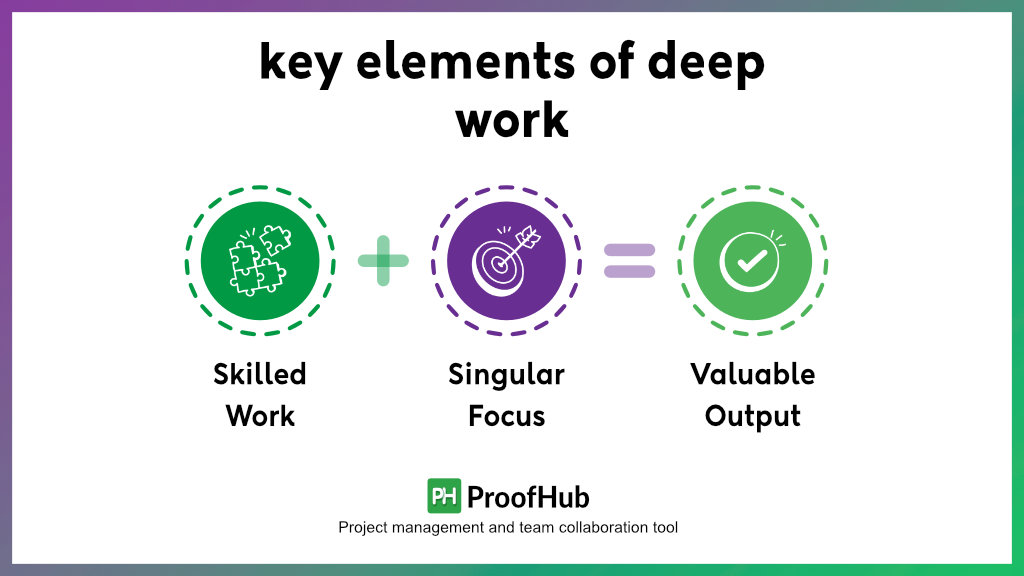
Imagine working on a sales forecast report for 4 hours at a stretch, where you’re tactfully reading KPIs, crunching data, and reaching to valuable conclusions, not flickering your unbound flow to answer messages, or reading Tweets, but tirelessly connecting the statistical dots, enabling your mind to unleash it’s natural ability to deliver great work.
Deep work vs. Shallow work
Shallow work is the present reality for a lot of people. It stands in stark contrast to Deep Work, characterized by a distracted work mindset and un-engaging tasks that return mediocre results.
When you sit down for a task intermittently switching between your phone and laptop, realizing hours have gone by without any valuable progress – that’s shallow work.
Broadly we can associate it with three key phrases;
- Laborious Work – What you’re doing isn’t fully aligned to your will.
- Fluttering Cognitive Engagement – Your attention is on-and-off while you do it.
- Subpar Output – The value you create doesn’t meet expectations, as a result.
At this point, you must be thinking, can Shallow Work be converted into Deep Work?
The answer is yes.
Cal Newport and other productivity masters offer a complete Deep Work guide to learn and benefit from it.
It’s important to remember that Deep Work isn’t a set of instructions but a skill to be honed.
Why does deep work matter?
The importance of Deep Work can be best understood by what it strives to achieve – Productivity and Value, both of which, are cornerstones of your professional ambition.
Statistics show that an exceeding number of people are falling behind their production schedules. Despite talent and unquestionable abilities, the output just isn’t up to the mark, which is destroying life satisfaction.
Quoting Cal himself, “If you don’t produce, you won’t thrive—no matter how skilled or talented you are.”
What this Unproductivity Survey says about us;
- 4 in 5 US workers don’t sleep well enough, and 1 in 4 completely lose productivity due to lack of sleep.
- People with faded productivity sometimes skipped lunch breaks to finish the work at hand.
- At least 60% of US workers feel distracted at the office due to talkative co-workers, and only 19% find background noise not distracting.
- 46% straight off agree that turning off their phone would make them more productive.
- A whopping 61% of workers felt if they had flexible work hours, they’d be more productive.
- 3 in 5 workers feel that stress is making them less productive.
- a 2014 Gallup survey stated that only 31.5% of employees felt motivated at their work.
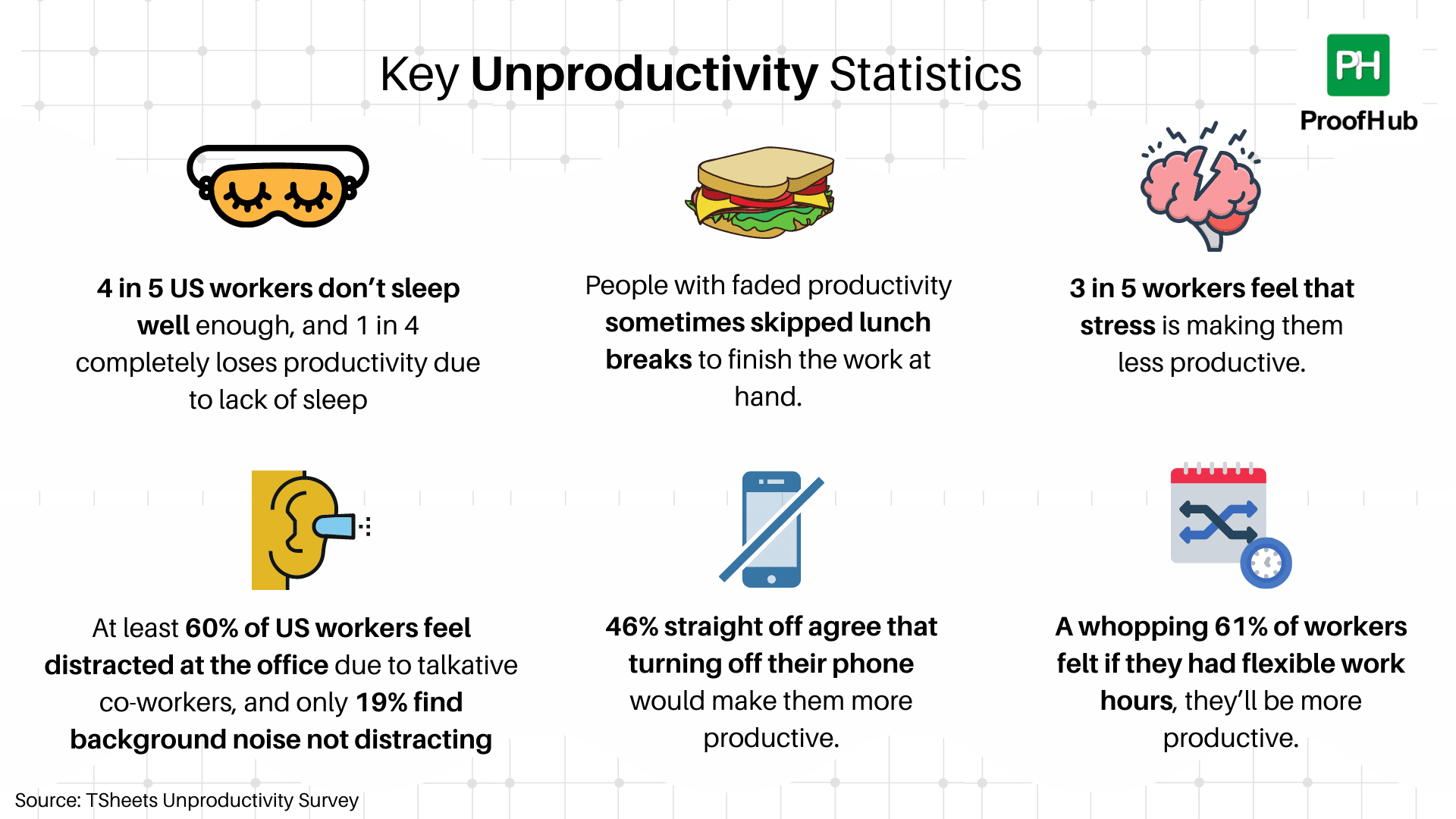
These insights largely comment on what breeds unproductivity at workplaces while also showing how unproductivity is a massive phenomenon.
The thing with unproductivity is that it not only steals man-hours from businesses but also impacts the employees’ work-life balance.
An article in the Journal of Labour Economics elucidated that happiness breeds productivity. I believe that in the same way, the ability to stay productive also inspires the feeling of happiness.
And happiness is one thing that is on everyone’s goal list.
Also Read: Happy Work Culture – What It Is, Why It Matters, and How It’s Built
Deep Work offers a way of living that cultivates productivity that rewards the individual with the gifts of happiness and smoother lifestyles.
Therefore, Deep Work holds extreme importance in today’s economy where achieving excellence, and making work both financially and personally rewarding is an eternal pursuit.
How can I do deep work?
Cal Newport, in his Deep Work guidebook, has created a methodology to do Deep Work. Essentially, these are a mix of psychological clues, experience-based facts, and techniques that will help you maintain productivity on a stretch.
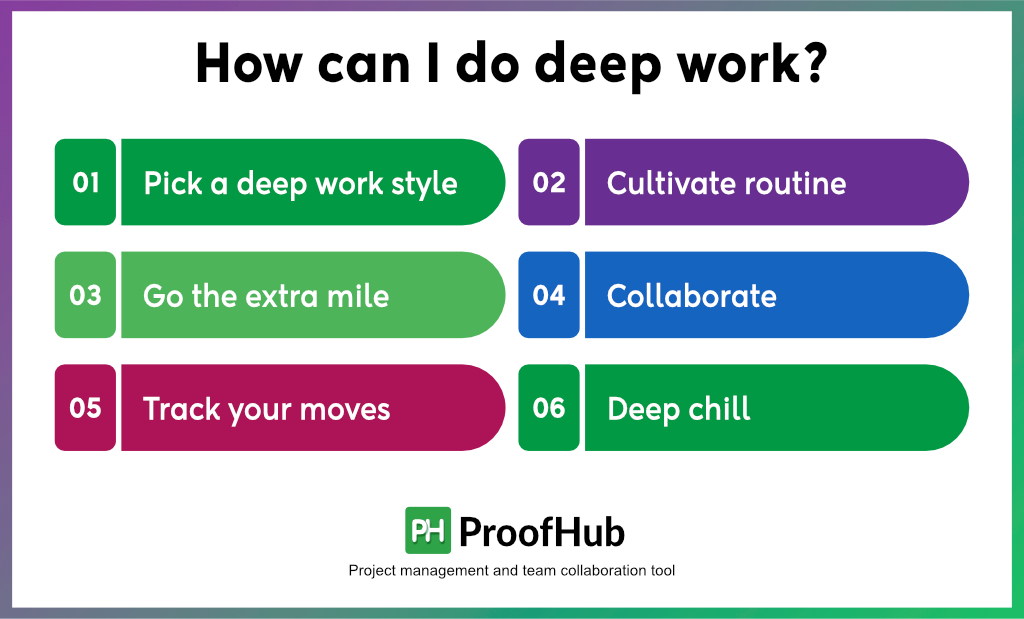
As you familiarize yourself with Deep Work How-To, make sure to interpret them as Words of Wisdom and not some Rule Book to Success.
1. Pick a deep work style
Deep Work has 4 major work styles based on how you integrate them into your routine. You can adopt any one or a combination of many, that you find the most relevant.
- Monastic – In this style, you dedicate most of your “work time” to doing highly-focused tasks. There’s minimal to no room for shallow tasks, that don’t require full attention, and all kinds of distractions are minimized.
- Bimodal – Bimodal style is when you break your deep focus tasks into spans of weeks or months in your schedule. You’re not always doing deep work but you have a calendar for when to get back to it, for certain selected activities.
Adam Grant follows this style, where he assigns some months for hardcore research and others for teaching at Wharton.
- Rhythmic – This style entails scheduling certain hours in a day for Deep Work and the rest of the time for catering to other preferences. You create a rhythm in which you alternate between Deep and Shallow Work.
- Journalistic – Journalistic style refers to a “when possible” scheduling. This works the best for people who can’t predict their schedules and indulge in Deep Work whenever it is possible. It’s the hardest to achieve without prior Deep Work experience.
My personal favorite is the Rhythmic style as it allows me to focus in isolation for 3-4 hours daily, and spending the rest of the time with the team.
You can have your pick!
2. Cultivate routine
As humans, we have an inherent love for patterns but we don’t stick to them easily. Therefore, building a routine will be helpful, in order to best execute this Deep Work guide. Here what you should focus on;
- Environment – Find a peaceful environment that helps you build unshakeable focus. It could be your bedroom, an empty meeting room, or even the library. You can further reduce distractions with noise-canceling headphones.
- For How Long – Some people can sit for 8 hours straight while some may want to work in bursts of 15 minutes. It’ll be good to figure out a time period that you want to dedicate to Deep Work, as it’ll help you organize things easily.
- What’s Allowed – While you’re in the Deep Work mode, make certain rules that help you sustain it. For instance, working at the study table and not the bed, allowing a snack break after 2 hours, or switching off the phone completely.
- Supplements – Make use of productivity supplements that work the best for you. For me, it’s always white noise, green tea, and blackboard. You’ll have your own toys that help you be in your bubble solidly, find those.
3. Go the extra mile
Deep Work will require deep investment, something our distracted lifestyles don’t support.
Hence, Cal suggests that going the extra mile to make Deep Work possible for you, is important. In his own Deep Work guide book, he calls this, “Executing a Grand Gesture”.
What he is talking about is – commitment. If you feel your work from the endeavor is not productive, you can choose to shift to a co-working cubicle near your home. Or if your PC is slow and bumpy, you can choose to get a higher-end model that runs smoothly.
The idea is to commit to Deep Work by going the extra mile and not let petty excuses come your way. Some people go as far as renting an isolated cabin in the woods to ensure focus.
4. Collaborate
One potential downside of working in isolation is limiting the scope of your ideas.
If your work involves collaborating with others, it can be a great tool for creativity and productivity. Collaboration allows for new ideas to be born, and new perspectives to be shaped that are hard for the individual to come up with.
ProofHub provides distraction-free tools for productive team collaboration. Try now to learn the difference!
If you want to Deep Work with one of your colleagues, that’s also completely fine, until you both are focused. Bouncing ideas and engaging in conversation is fruitful.
Just remember to not erratically switch between work and talking, as it may deviate your focus. Keep your conversation organized to avoid distraction.
5. Track your moves
Any Deep Work guide that you may ever read, need not be obsessed about, rather practiced with devotion. In order to not slip in your ambition to learn Deep Work skills, you need to track how positive the exercise is turning out to be. For this, you can follow the below-mentioned guidelines.
- Check Your Focus – Make sure you’re focussing on the highest priority task in your focus time. Quoting Cal, “Who you are, what you think, feel, and do, what you love—is the sum of what you focus on.” Hence, don’t let menial or less important things trick you, reserve your focus for the prime task.
- Focus on Time Spent – It’s a good practice to lay stress on the time spent, rather than how much is there to achieve. You should be able to derive how much are you achieving in a sitting such as lines of code written, paragraphs completed, cases closed, etc. That’s the real metric of performance.
- Create a Log – It’s advisable to go as far as keeping a log of hours spent in Deep Work and keep it handy for reference. This self-imposed logging will drive you to optimize your work delegation and focus-time spending.
Here’s an example of a simple Deep Work Log:
| Day of the Week | Monday | Tuesday | Wednesday | Thursday | Friday |
| Hours Spent | 4 | 5 | 3 | 6 | 4 |
| Blogs Written | 1 | 1.5 | 1 | 2 | 1.5 |
- Consistent Reviews – The best way to tell if you’re actually progressing is to hold reviews after some time. You can check the ratio of progress made in a week to the amount of time spent and decide if you need to spend more time or cut down Deep Work.
These four measures work like self-check mechanisms, preventing you from drifting off from your ultimate goal, and follow the Deep Work guide properly.
6. Deep chill
As a rule of thumb, Deep Work should proceed with Deep Chill.
Deep Chill is your downtime or relaxation time wherein you’re devoted to “not working at all”. It asks you to unwind without checking work emails and staying away from the PC.
Cal explains that your mind requires time to replenish from the brain muscle-flexing done while Deep Work. You need to shut it down comprehensively to be able to achieve the same focus the next day.
If you continue to work even in your downtime, the mind gets over-occupied, leading to fatigue and overall inability to be productive again.
Hence, let your chill time be as uninterrupted as your work time.
How do you develop focus?
I hear you thinking – this Deep Work guide thing seems like a decent idea, but I am not sure if I can focus for that long.
I get you.
Developing focus for more than 1 hour can be tiring, and it’s just very easy to zone out, even by irrelevant notifications of marketing emails, especially when working from home.
I have also seen people having a particularly resistive mindset to adopting new productivity techniques. “This sounds great on paper, but in theory, this is not practical”.
The good news is that there are ways to overcome such thoughts, follow me.
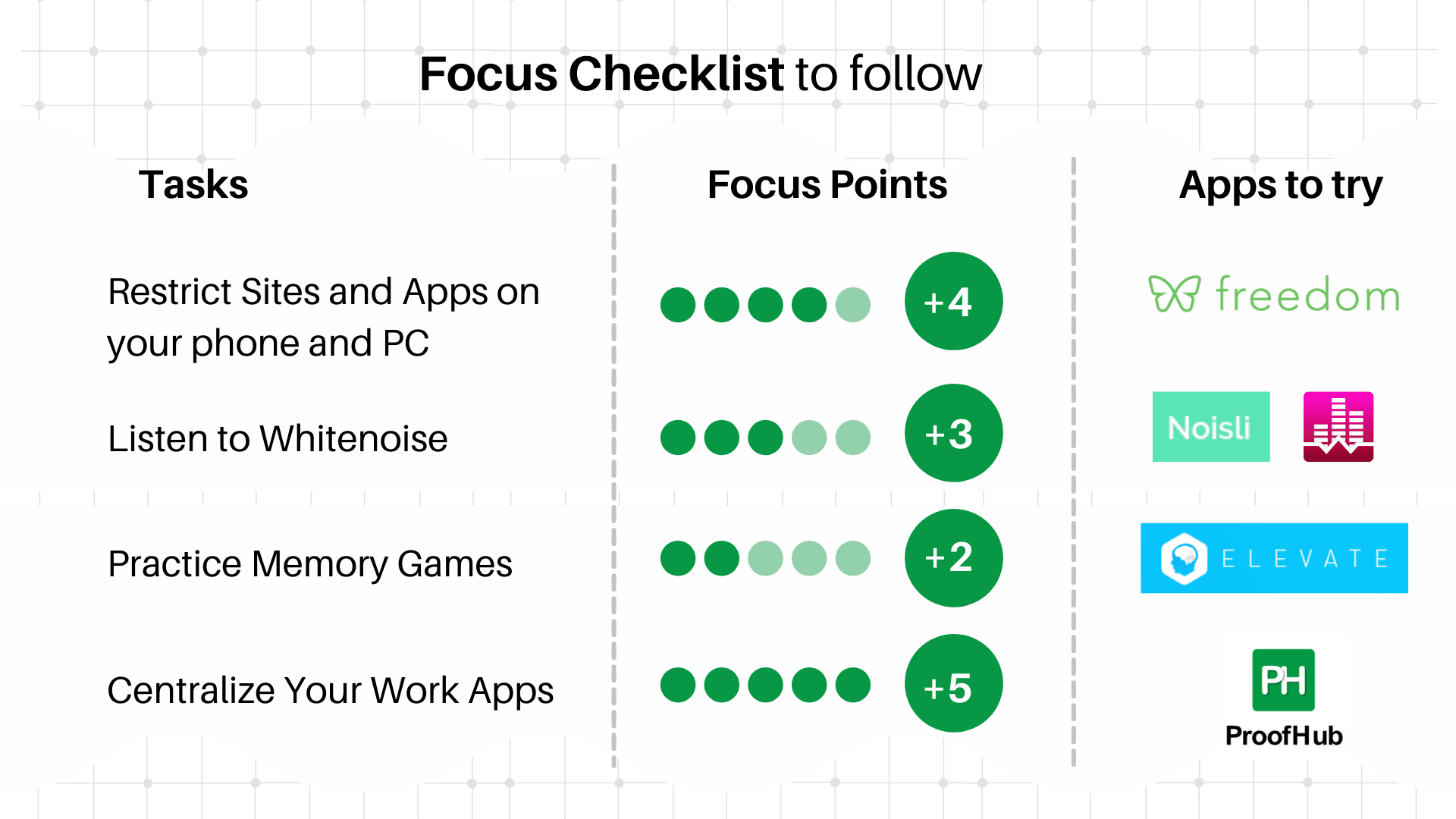
Restrict sites and apps on your phone and PC
Freedom is an app that helps you self-impose restrictions on shopping, social media, entertainment websites that you’re prone to get distracted from.
It runs on your PC as well as on your phone, keeping restricted websites blocked during your Deep Work time. I have found it useful as I tend to click away from my work, knowing well I shouldn’t do so. Checkout Rescue Time alternatives here.
Listen to whitenoise
Whitenoise is the single most beneficial thing I use to maintain focus while working. It shuts off background noise and lets the mind be busy in the thought process, feeling more occupied.
White Noise Lite offers a library of sounds that work really well in keeping your mental focus aligned with your thoughts.
Noisli does the same thing without downloading an app on your computer.
Practice memory games
Memory games are great in helping you hit the sweet spot of focus repeatedly. I spend about 15-30 minutes exercising the brain muscle via fun games that make my mind focus-friendly.
Elevate is an app that offers several mind games that kickstart your temporal focus.
Centralize your work apps
Switching between several apps for work is a productivity drainer, therefore I suggest shifting your work to all-in-one tools that minimize switching.
ProofHub is one such tool that helps teams communicate on tasks, manage calendars, and chat easily while offering a bundle of project management features. You can manage your entire work from one browser tab which is a real gain.
Replace the many work apps you use with one powerful, all-in-one software. Switch to ProofHub!
Detox your work lifestyle
Our work lifestyles are plagued with distractions without us realizing. Your communication tools, work tools, and so-called productivity apps may be passively eating away at your time, and making you work more.
It’s time for some detoxification and the goal is –
“To spend less time on tools and,
to prevent attention spans from deteriorating.”
Choose tools wisely
It’s necessary to understand what is consuming your time.
In my experience, this can be done by choosing tools wisely. Not being obsessive about saving time, but being aware of drainage.
Here’s how to choose tools wisely;
- Solves the purpose – Choose a tool that solves your purpose and does it nicely, without thinking too much about what else can it do.
For example – I use my phone’s alarm clock as a sedentary reminder, scheduling automatic alarms for every 1 hour. There are thousands of apps for it but the alarm clock does the job for me pretty well.
- Worth the side-effects – Some tools do have some unavoidable side effects but also have way too many positive factors. Keep a tool if it can cross out downsides with benefits.
For example – I use Whatsapp for keeping in touch with business and personal contacts, even when it’s a little distracting. Now that there are so many people on the same platform, I use it despite its bottlenecks.
Cut down on or eliminate social media
After taking planned breaks from Social Media 3 times; first for 2 weeks, then for 2 months, and then for one straight year, I realized that Social Media didn’t really add any significant value to my life.
It’s just there as luxury and to connect with insane people, whom I can absolutely do without.
My work circle is there on Skype, and contacts are there on Slack.
Hence, I personally recommend restricting Social Media apps. You can also restrict their usage with activity timers that come with almost every Social Media app now.
Have planned days
It’s not important to religiously stick to plans but by creating a daily planner, you can be time-frugal.
Don’t spend any time that is too expensive to spend. I have learned this lesson the hard way by having to work 12 hours in a day because my focus time was going into mundane activities.
Now, I have reduced the work time spending to 9 hours and put away 3 hours for high-quality leisure such as reading, and going on bicycle trips.
I find my low-key ProofHub Calendar module sufficient for daily planning, as it stops me from relying on another 3rd party app.
Make accurate plans for the entire team, and organize better with ProofHub. Signup now!
Conclusion
Deep Work is a way of work that is changing lives around the world. You’ll find a number of tech leaders such as Bill Gates, Sundar Pichai, Elon Musk practicing it in their own ways.
It’s no secret to greatness, it’s just polishing the greatness in you to a new level. As I believe, everyone is capable of great work until they realize it.
I believe the tools that we use for our daily day work activities and our overall ambition to achieve our goals, defines how productive we can be. This Deep Work is just a pathway to get there.
I created ProofHub with this sole mission of helping teams stay productive, and it has always amazed me that changing “how” you do your work can revolutionize “what” you do.

